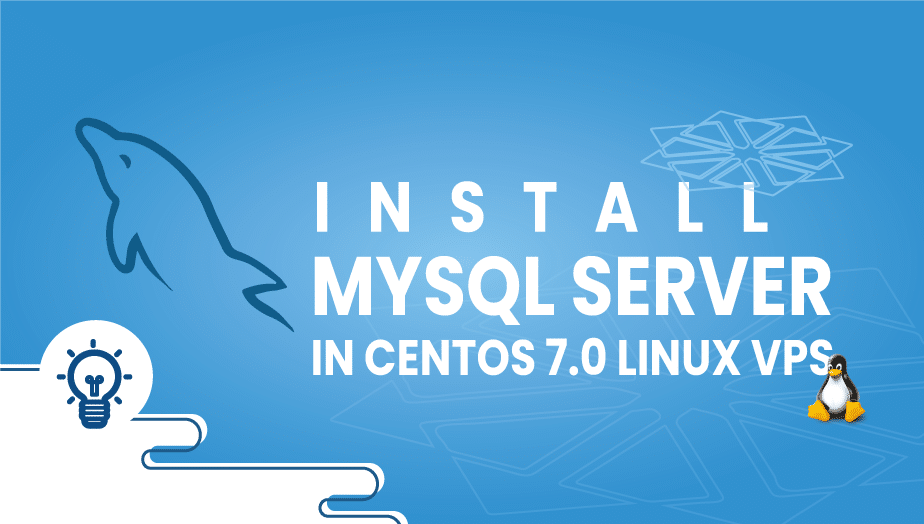MySQL is a popular open-source relational database administration system businesses use to store and manage data. When combined with a Linux virtual private server (VPS), MySQL can provide a powerful and flexible database solution that can be customized to meet the business’s unique needs. This article will discuss the installation, supremacy, and disadvantages of using MySQL on a Linux VPS and provide tips for optimizing its performance.
This is how you install it.
CentOS 7.0-based VPSies will not contain MySQL-server yum package. This is because, in CentOS release 7.0, it was replaced by MariaDB, a successful fork from MySql.
For interested parties, MySQL folks have created a unique repository for RHEL5/6/7-based platforms and Fedora 20 and 21.
The following two links will provide all the necessary information to install the MySql server in Centos 7:
http://dev.mysql.com/doc/mysql-repo-excerpt/5.6/en/linux-installation-yum-repo.html
http://dev.mysql.com/downloads/repo/yum/
You can try this database installation on our platform in a few minutes utilizing our PCS (Private Cloud Solution), which allows you to have VPSie(s) on a private network – NAT – Port forward – traffic control for inbound and outbound – multiple gateway IPs which you could use for the load-balancing and failover.
Advantages of MySQL Server on a Linux VPS:
- Scalability: Linux VPS plans can be easily scaled up or down dependent on the needs of the business, making them a flexible option for businesses of all sizes.
- Customizability: With a Linux VPS, businesses have complete control over their server environment, including the ability to customize their software stack and optimize their server configuration for performance.
- Security: Linux VPS plans are known for their robust security features, including firewalls, intrusion detection, and data encryption. When combined with MySQL’s built-in security features, businesses can be assured that their data is secure and secure.
- Cost-effective: Using MySQL on a Linux VPS can be a cost-effective solution for businesses. VPS plans are more affordable than dedicated servers or cloud hosting solutions.
- Performance: Linux VPS plans are designed to provide high performance, which is essential for businesses that rely on their database for critical operations. MySQL’s fast data processing capabilities can further enhance the system’s performance.
Disadvantages of MySQL Server on a Linux VPS:
- Technical Knowledge Required: Setting up and managing a Linux VPS requires technical expertise, which may only be available to some businesses. This can increase the risk of errors and downtime.
- Limited Support: Linux VPS plans typically have little support, meaning businesses must rely on their technical resources or external service providers for assistance.
- Security Risks: While Linux VPS plans are generally considered secure, businesses must ensure that their server environment is appropriately configured and maintained to prevent security breaches.
- Resource Limitations: Linux VPS plans have resource limitations, including RAM, CPU, and storage space. Businesses must carefully monitor resource usage to avoid overloading the server and causing performance issues.
- Backup and Recovery: Businesses must develop and implement a backup and recovery strategy to protect their data during a system failure or other disaster.
Optimizing MySQL Server Performance on a Linux VPS:
- Use the latest version of MySQL: MySQL releases new versions regularly that include performance improvements and bug fixes. Upgrading to the latest version can help improve performance.
- Optimize queries: Slow queries can have a significant impact on the performance of the database. Businesses can optimize queries by indexing, reducing the number of joins, and using stored procedures.
- Use caching: Caching can help improve the performance of the database by reducing the number of requests to the server. MySQL supports various caching techniques, including query caching and table caching.
- Monitor resource usage: Businesses must monitor their resource usage, including CPU, RAM, and disk space, to avoid overloading the server and causing performance issues.
- Implement a backup and recovery strategy: Businesses must develop and execute a backup and recovery strategy to protect their data during a system failure or other disaster.
Conclusion: MySQL on a Linux VPS can provide businesses with a powerful and flexible database solution. Linux VPS plans offer scalability, customizability, security, cost-effectiveness, and high performance.
MySQL server is an open-source relational database management system that is widely used by businesses to store and manage data.
Using a MySQL server in a Linux VPS provides several benefits, such as improved security, scalability, and flexibility. It also allows you to run multiple applications on the same server.
Some advantages of using a MySQL server in a Linux VPS include the following:
- Improved security: By running your database on a separate server, you can minimize the risk of attacks and data breaches.
- Scalability: With a MySQL server in a Linux VPS, you can easily scale up or down depending on your business needs.
- Flexibility: You can customize the server to meet your specific requirements, such as adding new features or applications.
Some disadvantages of using a MySQL server in a Linux VPS include the following:
- Complexity: Setting up and maintaining a MySQL server in a Linux VPS can be complex and requires technical expertise.
- Cost: While open-source, there may be costs associated with setting up and maintaining the server, including hardware, software, and personnel.
- Performance: Depending on the size of your database, running it on a virtual server may affect its performance.
Setting up a MySQL server in a Linux VPS requires technical knowledge and expertise. It involves selecting a VPS provider, choosing a Linux distribution, installing and configuring the server, and securing the server. It is recommended to advise a professional or follow a detailed guide to ensure a successful installation.
Yes, a MySQL server in a Linux VPS can handle multiple databases. It provides an efficient and scalable way to manage large amounts of data.
To ensure the security of your MySQL server in a Linux VPS, you can follow best practices such as:
Securing the server by using strong passwords and limiting access to authorized users.
Regularly updating the server and its software to prevent vulnerabilities.
Using encryption to protect sensitive data.
Monitoring the server for suspicious activity and responding promptly to any incidents.























